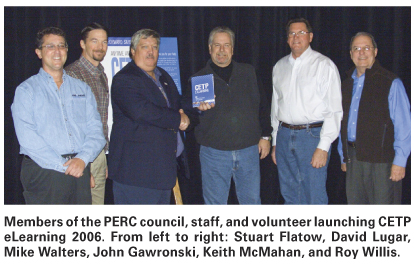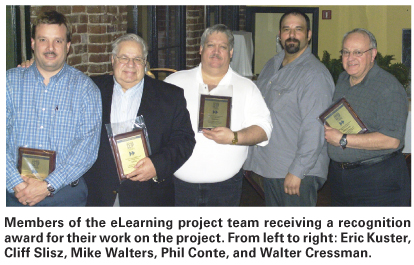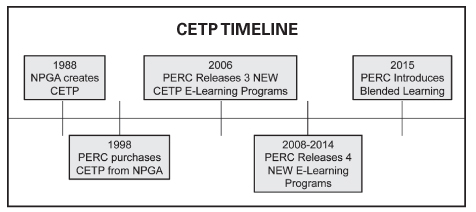Thursday, November 10, 2016
(By John Kamps, owner of Kamps Propane, Manteca, Calif.)
Ten years ago you would have never imagined having a phone in your pocket that can send an email, store all of your music, and doesn’t have to be flipped shut to end a call. Technology moves us forward and allows information to be more readily available. And just like mobile phone technology has evolved over the past 10 years, so has training for the propane industry.
In early 2000, I started to think about technology that could help train my employees — and those of other propane marketers — that didn’t rely solely on sending them to a far-away classroom or depending on a class schedule that wasn’t always convenient. My goal was to maintain a high level of professionalism and introduce technology into every area of our industry so that our safety and training programs could keep up with new propane appliances, equipment, and vehicles.
That’s when I started the discussion of computer-based training with my fellow PERC council member Walter Cressman, who at that time was the owner of Cress Gas. The Propane Education & Research Council (PERC) assembled an industry taskforce to think through how we could deliver the Certified Employee Training Program (CETP) as computer training.
Now, you need to remember that at the time this was a ground-breaking idea for our industry. As with any proposed new way of doing something, we faced a not insignificant amount of push-back from many in the industry who thought that computer-based training would be the death of classroom training. This, of course, turned out not to be true.
We also had a lot of people say that computer-based training was only for “young folks.” So here were Walter and I as two sixty-somethings pushing to bring training into the 21st century. Kind of ironic!
In the end, PERC funded the first three CETP E-Learning courses, and I’m really glad we did, because today thousands of propane professionals receive training using this method.
CETP-E Learning is now in its 10th year, and I’m very proud of what Walter and I started and how the industry has embraced it. I’m especially proud of the council for continuing to fund CETP E-Learning courses and the hard work and dedication that the industry volunteers and PERC staff continue to put forth to lift barriers associated with training and educating our most valuable assets — our employees.
In 2004, PERC approved funding to place four CETP textbooks into an electronic learning format, or e-learning. The technology was new, and the idea was to provide training to those who needed it after the training season had ended.
The taskforce worked diligently over the next two years to produce three CETP E-Learning programs: Basic Principles & Practices of Propane, which is overall the most used training program in the propane industry; Propane Delivery Operations & Cylinder Delivery, a combination of Delivery Basics and Propane Cylinder Delivery Operations; and Bobtail Delivery Operations. These programs were chosen by the PERC task force because of their strong sales and overall use by the industry. With assistance from adult educators and instructional designers, the task force reviewed and approved the three new e-learning programs and released them to the industry in the fall of 2006.

During the development of CETP E-Learning, PERC enlisted the help of industry volunteers, adult educators, instructional designers, and subject matter experts. PERC has always enlisted the help of industry volunteers to develop workforce training, but adding in the expertise of adult educators allowed PERC to develop a program specifically for the adult learner.
The e-learning program takes advantage of the five key assumptions of the adult learner, as defined by American educator Malcolm Knowles, to understand how to train adults and what “learner types” — visual, auditory, kinesthetic, and read and write — exist. By putting industry volunteers and these adult learning techniques together, PERC created a learning program specifically tailored for our industry.
PERC received some initial push-back, but slowly marketers began to accept the program. In 2008, PERC surveyed marketers using CETP E-Learning and found that small marketers were more likely to use it for their company’s initial training program.
In 2012, CETP E-Learning was supported by a large marketer, Ferrellgas. Prior to that time, Ferrellgas utilized its own company-developed training program, but after reviewing e-learning, the company changed its policy to require its employees to complete CETP training using CETP E-Learning. This shift did not just occur at Ferrellgas; other propane companies and state associations also started taking a closer look at using the program to deliver training to marketers.
In the 2008 survey, over 90% of those surveyed wanted to put CETP E-Learning online. This fact, along with the rest of the survey’s findings, started the ball rolling for the next evolution in training: blended learning.
This method provides students access to the course content online prior to attending the class. This allows students to become familiar with the content, and reduces actual time spent in the classroom. A three-day class becomes a one-day review class with blended learning.
In 2015, PERC funded a blended learning program for the Colorado Propane Gas Association (CoPGA) to solve the problem of class cancellations. Of the 12 classes CoPGA scheduled in 2014, eight had to be canceled because of low attendance. With the guidance of Courtney Gendron, PERC program manager for CETP, CoPGA scheduled four blended learning classes for the 2015 training season.
The results were a success. Each of the four classes had full attendance and a 100% pass rate for the National Propane Gas Association CETP Certification exam. The success of the CoPGA blended learning program has inspired other states and companies to sign up to try blended learning.
PERC hopes to provide access to CETP E-Learning online for the entire propane industry in the near future. But in 10 years the industry has come a long way in accepting CETP E-Learning as a training tool. That’s an accomplishment worth celebrating and couldn’t have been done without the hard work and dedication of many in our industry.
Working together with PERC, our training programs can continue to evolve with our industry’s changing needs and provide outstanding resources for our employees.
(By John Kamps, owner of Kamps Propane, Manteca, Calif.)
Ten years ago you would have never imagined having a phone in your pocket that can send an email, store all of your music, and doesn’t have to be flipped shut to end a call. Technology moves us forward and allows information to be more readily available. And just like mobile phone technology has evolved over the past 10 years, so has training for the propane industry.

In early 2000, I started to think about technology that could help train my employees — and those of other propane marketers — that didn’t rely solely on sending them to a far-away classroom or depending on a class schedule that wasn’t always convenient. My goal was to maintain a high level of professionalism and introduce technology into every area of our industry so that our safety and training programs could keep up with new propane appliances, equipment, and vehicles.
That’s when I started the discussion of computer-based training with my fellow PERC council member Walter Cressman, who at that time was the owner of Cress Gas. The Propane Education & Research Council (PERC) assembled an industry taskforce to think through how we could deliver the Certified Employee Training Program (CETP) as computer training.
Now, you need to remember that at the time this was a ground-breaking idea for our industry. As with any proposed new way of doing something, we faced a not insignificant amount of push-back from many in the industry who thought that computer-based training would be the death of classroom training. This, of course, turned out not to be true.

We also had a lot of people say that computer-based training was only for “young folks.” So here were Walter and I as two sixty-somethings pushing to bring training into the 21st century. Kind of ironic!
In the end, PERC funded the first three CETP E-Learning courses, and I’m really glad we did, because today thousands of propane professionals receive training using this method.
CETP-E Learning is now in its 10th year, and I’m very proud of what Walter and I started and how the industry has embraced it. I’m especially proud of the council for continuing to fund CETP E-Learning courses and the hard work and dedication that the industry volunteers and PERC staff continue to put forth to lift barriers associated with training and educating our most valuable assets — our employees.
In 2004, PERC approved funding to place four CETP textbooks into an electronic learning format, or e-learning. The technology was new, and the idea was to provide training to those who needed it after the training season had ended.
The taskforce worked diligently over the next two years to produce three CETP E-Learning programs: Basic Principles & Practices of Propane, which is overall the most used training program in the propane industry; Propane Delivery Operations & Cylinder Delivery, a combination of Delivery Basics and Propane Cylinder Delivery Operations; and Bobtail Delivery Operations. These programs were chosen by the PERC task force because of their strong sales and overall use by the industry. With assistance from adult educators and instructional designers, the task force reviewed and approved the three new e-learning programs and released them to the industry in the fall of 2006.

During the development of CETP E-Learning, PERC enlisted the help of industry volunteers, adult educators, instructional designers, and subject matter experts. PERC has always enlisted the help of industry volunteers to develop workforce training, but adding in the expertise of adult educators allowed PERC to develop a program specifically for the adult learner.
The e-learning program takes advantage of the five key assumptions of the adult learner, as defined by American educator Malcolm Knowles, to understand how to train adults and what “learner types” — visual, auditory, kinesthetic, and read and write — exist. By putting industry volunteers and these adult learning techniques together, PERC created a learning program specifically tailored for our industry.
PERC received some initial push-back, but slowly marketers began to accept the program. In 2008, PERC surveyed marketers using CETP E-Learning and found that small marketers were more likely to use it for their company’s initial training program.
In 2012, CETP E-Learning was supported by a large marketer, Ferrellgas. Prior to that time, Ferrellgas utilized its own company-developed training program, but after reviewing e-learning, the company changed its policy to require its employees to complete CETP training using CETP E-Learning. This shift did not just occur at Ferrellgas; other propane companies and state associations also started taking a closer look at using the program to deliver training to marketers.
In the 2008 survey, over 90% of those surveyed wanted to put CETP E-Learning online. This fact, along with the rest of the survey’s findings, started the ball rolling for the next evolution in training: blended learning.
This method provides students access to the course content online prior to attending the class. This allows students to become familiar with the content, and reduces actual time spent in the classroom. A three-day class becomes a one-day review class with blended learning.
In 2015, PERC funded a blended learning program for the Colorado Propane Gas Association (CoPGA) to solve the problem of class cancellations. Of the 12 classes CoPGA scheduled in 2014, eight had to be canceled because of low attendance. With the guidance of Courtney Gendron, PERC program manager for CETP, CoPGA scheduled four blended learning classes for the 2015 training season.
The results were a success. Each of the four classes had full attendance and a 100% pass rate for the National Propane Gas Association CETP Certification exam. The success of the CoPGA blended learning program has inspired other states and companies to sign up to try blended learning.
PERC hopes to provide access to CETP E-Learning online for the entire propane industry in the near future. But in 10 years the industry has come a long way in accepting CETP E-Learning as a training tool. That’s an accomplishment worth celebrating and couldn’t have been done without the hard work and dedication of many in our industry.
Working together with PERC, our training programs can continue to evolve with our industry’s changing needs and provide outstanding resources for our employees.
(By John Kamps, owner of Kamps Propane, Manteca, Calif.)

